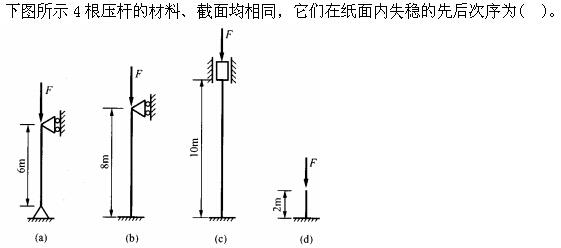[A] legislative [B] legitimate [C] legalized [D] liberal
题目
[A] legislative [B] legitimate [C] legalized [D] liberal
相似考题
更多“[A] legislative [B] legitimate [C] legalized [D] liberal ”相关问题
-
第1题:
DU标签分发方式下,如果采用Liberal保持方式,则设备会保留所有LDPPeer发来的标签,无论该LDPPeer是否为到达目的网段的下一跳。A.错误
B.正确
参考答案:B
-
第2题:
下面用二元组表示的数据结构为线性结构的是 。
A.B=(D, R) D={a, b, c, d} R={<a, b>,<a, c>,<a, d>}
B.B=(D, R) D={a, b, c, d} R={<a, d>,<b, a>,<c, b>}
C.B=(D, R) D={a, b, c, d} R={<a, b>,<c, d>,<c, b>}
D.B=(D, R) D={a, b, c, d} R={<a, c>,<b, d>,<a, b>}
二叉树 -
第3题:
A、B、C、D为任意集合,以下正确的是
A.(A∪B)´(C∪D) = (A´C)∪(B´D)
B.(A-B)´(C-D) = (A´C)-(B´D)
C.(A∩B)´(C∩D) = (A´C)∩(B´D)
D.(AÅB)´(CÅD) = (A´C) Å (B´D)
A ´ (B∪C) = ( A ´ B)∪( A ´ C) -
第4题:
 A.(a)、(b)、(c)、(d)
A.(a)、(b)、(c)、(d)
B.(d)、(a)、(b)、(c)
C.(c)、(d)、(a)、(b)
D.(b)、(c)、(d)、(a)答案:A解析:杆失稳与A有关,A越大,越容易失稳。 -
第5题:
3、A、B、C、D为任意集合,以下正确的是
A.(A∪B)´(C∪D) = (A´C)∪(B´D)
B.(A-B)´(C-D) = (A´C)-(B´D)
C.(A∩B)´(C∩D) = (A´C)∩(B´D)
D.(AÅB)´(CÅD) = (A´C) Å (B´D)
A ´ (B∪C) = ( A ´ B)∪( A ´ C)
